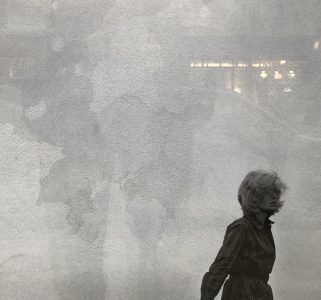Quite why Jake accepted to work for an orthodox and traditional arm of government is one for the depth psychologists. Jake – or J.D. – had studied political philosophy at a very good university during the radical years of the late 60s; in consequence, he had developed a generalised anti-bourgeois outlook. It follows that J.D. was not, prima facie, suited to work in a conservative institution that was in the business of social control rather than social change. J.D. looked like the kind of man who was into political philosophy: he was thin, had straight dark shoulder-length hair, rarely smiled, and wore varieties of blue denim. When he spoke his voice sounded like a drying wind streaming over symphonies of sand paper. He was clever – in a sparing kind of way; his gaze was penetrating – unsettling even.
J.D. drove to work in an Opel Manta; his car was painted a kind of antique yellow: it had shiny black plastic seats and it rocketed him to work through the country lanes of Hampshire. (Nowadays it would be a ‘cool’ car to drive. And I would certainly like to have one.) En route, he listened to Radio 4 news on his car radio; he shouted expletives at what he heard and interspersed his Radio 4 listening with music tapes. J.D. read ‘Rolling Stone’. That meant he was pretty much up-to-date with all things rock; his music tapes reflected that up-to-date-ness.
Of course he didn’t really want to work for the government – or anyone else for that matter. He wanted to be a rock music critic or a writer. The trouble with J.D. was that he was an angry man – and so he tended to find fault with things and his anger was prone to realise itself in plain nastiness; he allowed his agonistic outlook to surface in his writing – and that didn’t always make for good reading. He even shouted abuse at the philosophers who suddenly appeared on the TV in the 1978 series called ‘Men of Ideas.’ They didn’t deserve to be shouted at; anyone should know that it’s not easy conversing in an intelligible manner about philosophy. BUT J.D. did not find fault with a picture of Van Morrison that he discovered in the rock magazine ‘Rolling Stone’. And the photo showed Van Morrison sitting in the kind of place that makes for good rock photos – a place made a million times better because next to him was a new kind of music machine – a Hitachi ghetto blaster. J.D. admired the whole concept of the ghetto blaster and its semiotic mix of the now and the hip and power and mobility. The photo served to underline the complete mis-match between him and his job in government service.
As he drove to work, and as he listened to his music, and as he shouted at the musings of the Radio 4 people, strong and powerful images of alternative ways of life started to take shape in his mind. Maybe a catalyst was Springsteen’s ‘Darkness on the edge of town’. ‘Darkness on the edge of town’ went well with J.D. and his Opel Manta but it didn’t go so well with country lanes in Hampshire; that’s obvious. Maybe Neil Young’s ‘Comes a time’ was a major factor; maybe for J.D, the time had come to stop playing the government game. But for sure, Waylon and Willie’s new ‘outlaw’ music album had something to do with it: he paid close attention to the mood of the album, to that strangely perfect melding of melody and lyrics …
He knew the words of Waylon and Willie’s ‘Mammas don’t let your babies grow up to be cowboys’: they went like this:
‘Cowboys ain’t easy to love and they’re harder to hold.
They’d rather give you a song than diamonds or gold.
Lone-star belt buckles and old faded Levis,
And each night begins a new day.
If you don’t understand him, an’ he don’t die young,
He’ll prob’ly just ride away.
Mamas, don’t let your babies grow up to be cowboys.
Don’t let ’em pick guitars or drive them old trucks.
Let ’em be doctors and lawyers and such.
Mamas don’t let your babies grow up to be cowboys.
‘Cos they’ll never stay home and they’re always alone.
Even with someone they love.’
Suddenly, it was all very simple. J.D. didn’t want to be a doctor or lawyer ‘or such’: he just wanted to ride away …
Which he did. I never saw him again.
P.S. The photo shows the back cover not of ‘Rolling Stone‘ but of ‘The International Times‘. It was the kind of thing those of us studying politics or psychology or all the good-time counter-cultural stuff in the ’60s would see and read.


